Galactic Zero
by Rachel Herman-Gross
A poem by Rachel Herman-Gross.
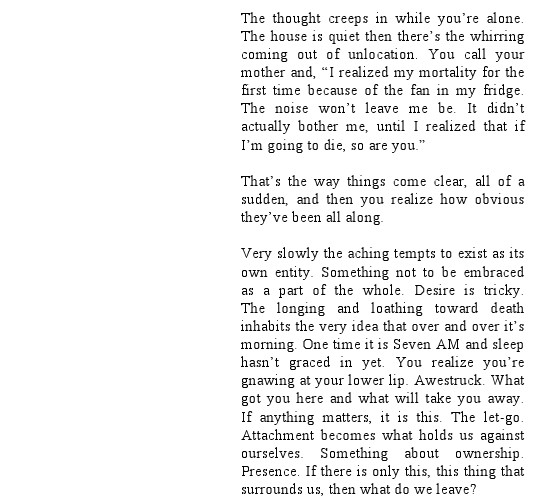
Rachel Herman-Gross is a native of Buffalo,NY. She graduated from Eugene Lang College, The New School for Liberal Arts, in 2006. She is a member of The Drunknsailors, where she serves as a Contributing Editor and is currently editing the second short story collection from Le Chat Noir. Her alter ego, Simone, is a working member of The Poetry Brothel. Rachel is also published in Release, Types of Screws, The Porthole, Stretching Panties, Pax Americana and We Live for Blood and Glory. She lives and works in Brooklyn, NY.
The Next New World

Some years ago I toured a container ship as a guest of its ambitious young Yugoslav captain. It was by far the most awe-inspiring company tour I’ve ever been on; the sheer size and scale of everything we were shown made us feel utterly antlike, awestruck, and then awestruck again, in a different way, at the magnificence of what people are able to achieve when they put their minds to it.
These container ships are commonly 300 meters long or more, and they burn a very filthy low-grade petroleum sludge the consistency of Nutella that must be warmed in order for it to liquefy to a combustible state. For this reason the engine room, which seemed the size of a ballroom in a ducal palace, was unbelievably warm, even though the building-sized engine was barely idling. There are nearly five thousand container ships in total (plus over thirteen thousand tankers and almost nine thousand “bulk carriers” of iron ore, coal and so on,) and all these enormous vessels are plowing back and forth across the ocean at every moment, spewing all sorts of muck into the air and water in order to get us our cheap consumer goods. The pollution created by these ships is gargantuan, despite the shipping industry’s ludicrous attempts to acquire the PC-friendly veneer of “green transport.” Shipping contributes to the wreckage of ecosystems by belching rapacious jellyfish and other foreign beasts out of their ballast tanks; shipping contributes over 1.5 billion metric tons of CO2 exhaust every year (a rapidly growing figure); particulate matter from shipping exhaust rains onto the earth by the thousands of tons every day, infusing even the Arctic snow with soot and hastening the Arctic melt.
Container ship captains race across the oceans at maximum speeds in order to earn their bonuses; their ships are packed to the gunwales and beyond in order to make each trip pay as much as possible. There are complex, finely calculated risks of all kinds that the captains must take. For example if the weather is bad, it is quite possible that a container or ten will go springing straight off the boat and into the sea, so the containers must be arranged with the utmost care; the maximum number, but not so many that they go popping off in a storm. It’s said that over 10,000 containers are lost at sea every year.
Photographs can’t do the Port of Long Beach justice because the scale is impossible to convey. When you are in it, this endless vista of containers stacked at various heights reaches straight across the horizon, acres and acres of colored boxes strewn across your whole field of vision like a Lego set for giants. When faced with such a multitude it’s hard to remember that an NBA player could stand up straight in each one of those tiny Lego boxes — well actually, one million real Legos fit in each one. Just one standard forty-foot container can carry as much as 59,040 pounds of Snuggies, shiny leggings, Maroon 5 t-shirts, blenders, Christmas gewgaws etc., and over 100 million container loads cross the oceans every year.
It’s a fearful sight in a way, the Port of Long Beach, this endless, crushing vista of metal and dust, with not so much as a blade of grass to relieve the impression of an infinite, silent or clanking perpetual machine, of a global engine, of “global industry”; compare this to say, a view of Central Park, and you’ll feel you’ve landed in a nightmare scene out of Mordor (or Isengard, I guess). Or, look at it from the point of view of human will and ingenuity, and you can’t help but admire, then, all the power, all the cleverness and craft that is required to keep this monstrous metal beast alive, an ocean of boiling oil pounding and churning through all its countless thousands of colossal hearts of hot steel.
So how absurd is this, that we should foul the oceans and the air with these huge container ships, that the polar bears should die and the cities drown, so that some feckless citizen can go to Wal-Mart, buy a plastic bird feeder Made in China and thereby feel helpful to nature at the low cost of $3.49?
How come is all this? Because the American idea has quite plainly concentrated itself in just one word: MORE. Not better, not “enough”, but simply, MORE. How much do you want? The answer is always the same: MORE. More money, more things, more cars, more food, more booze, more bedrooms in a bigger house; bigger, faster, all you can eat, more than you want, for greed is good.
There’s really no point in telling people that they shouldn’t have what they want, because if they want it they are just going to have it anyway, if they can. But quite often we think we want things that in the event turn out to be not so desirable, like a whole lot of cocaine, for example, or we squeeze in a final helping of dessert.
Rich people very often have not thought for one instant about whether or not all this MORE is something they even want. It’s the water they’re swimming in, and therefore imperceptible. It’s really quite scary the way so many of the actual right-wing guys, not politicians but regular businessmen, who are saying they want MORE tax cuts because they want MORE for themselves, and they literally have never thought: what for? The other night at dinner I asked one very charming, well-off suit: Well, what’s the goal really? To get rich, he said dreamily. Well yeah but what for? I persisted. I mean, what do you want all this money for? (I said this kind of teasingly.) He looked at me in total incomprehension. “I am a good guy!” he exclaimed. “I won’t squander it!”
The mindlessness of this kind of materialism is clearly terrible for us all. But it’s not the materialism itself that is bad; there is a logical basis to it, viz., a keen concern for the physical things that surround us, and that is a rational response to chaos and terror. Beautiful dwellings and gardens, beautiful clothes, lovely food carefully prepared; these things can be sought, acquired and enjoyed with restraint and intelligence, without ruining the earth. We could have a rational materialism based on quality and order, on respect for our ecosystems and environments; we could actually expand our materialism to include the earth itself in the surroundings we mean to protect and beautify.
There are signs that a new materialism is already begun in the Western world. The locavore movement, slow food and the rise of farmers’ markets, the renewed interest in all kinds of craftsmanship; there’s a move toward quality, toward buying things from local craftsmen, toward staying away from the big box stores; these are quiet and gradual changes, but they are important; maybe in the end they are more important than explicit attempts to mock or revile our greed, as Bill Maher did so effectively in his “Christmas Message” to Oprah Winfrey last week.
As distressing as it is to consider that there is a lot of suffering in this world, and as necessary as it is to put that consideration first in a sane worldview, making things around us as beautiful as we can is still a worthy employment. The usual Manichean (or should I say American) habit of taking everything to extremes never seems to reckon with the possibility of a middle ground. If we redefine our materialism with an eye to the full appreciation and use of all we have, without mindless gluttony or hoarding, that alone might do more to save the earth than any amount of satire, or lobbying or politicking.
Which brings me to the End of the World. When we hear so many scary things about the wreck that is being made of everything from politics to education to industry, it is very easy to become so distressed that the literal End of the World does, in fact, seem nigh; one fears that human beings might be fated to perish from the earth. But there is another way to look at this, which is that the world really does end every single day, and we have to remake it all again the next day. In reality, we must decide every minute how to make a new world. Maybe it’s not doom that we are facing; it’s a difficult and interesting problem, instead; one that requires that we not throw up our hands in despair, but that we use all our ingenuity and energy to solve.
Maria Bustillos is the author of Dorkismo: The Macho of the Dork and Act Like a Gentleman, Think Like a Woman.
Possible Resolutions For The Apocalypse Year
by Natasha Vargas-Cooper
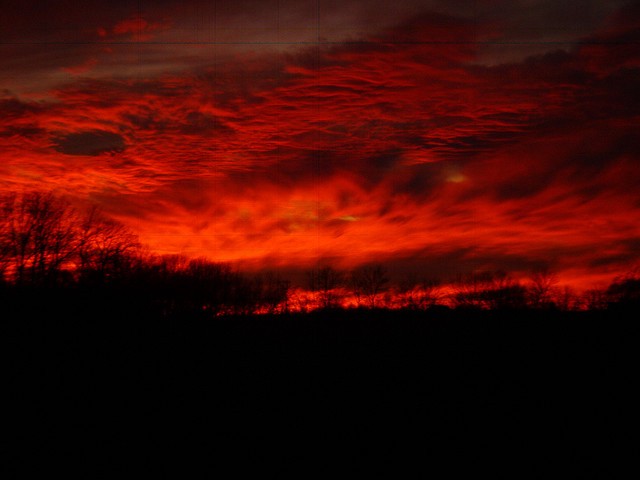
If I knew the world was coming to an end, I would fuck with impunity. I would crunch birth control pills between my teeth like they were pink Pez all day long. With the specter of annihilation on horizon, all would be carnage and I would need to start regularly shaving my legs.
I have a picture of every man I ever slept with. I’d pin each photo up on my living room wall, use a marker to rank each one based on looks, IQ and technique. I’d invite my friends over to drink and comment on the exhibition. I’d tell them all the secrets I was supposed to keep.
I’d grind RU-486 into my morning breakfast mush, just to be safe. Then I’d go steal one exquisite piece of clothing each day from a high-end department store.
To keep the money coming in I’d deal drugs: heroin, due to the more sedate clientele. I’d buy my father a fishing yacht and my mom an apartment in Paris.
I’d go to the house of this one guy and ask him to return the petite cut velvet blazer I left there a year ago under the assumption I would be invited back. I never was.
I’d fuck Quentin Tarantino. Twice.
I would try to feel good all the time. Life would no longer be the continuing mission of seeking out a quiet frequency on the radio dial or keeping my side of the street clean. I would be an entirely external creature, using anything besides my sense of self to sustain a delirious high.
I would allow the creeping nihilism I’ve kept mostly at bay to erupt like a geyser. My moods would be ruled by the strength of pills, the barrels of booze, and the decadent oblivion of crime, money and sex. After 365 days I’d be burnt to such a magnificent and malignant crisp that I’d welcome death.
Except. On the day the news first broke that it was all going to end, I would get on a flight to ______. I’d go to your apartment, the one I used to have a key to. I’d bang on the door until you opened it. I’d fall at your feet. I’d beg. I’d plead. I’d promise. I’d cry. I’d remind you that it couldn’t last more than a year.
If you let me in, I would never leave again.
Natasha Vargas-Cooper wrote that book.
Photo by Michael Lehenbauer, from Flickr.
Wait For It
by Mike Riggs

I have known some impatient people over the years who couldn’t wait for the end of the world.
So they killed themselves.
Eric and his mom lived in a one-room rental with a carport and no fence. Eric and my little brother and I all went to school together. My brother said people used to make fun of Eric because he didn’t wear clean clothes. He also said Eric liked to pick on other kids. From what I remember, Eric always had a smudge of dirt on his face, as if he dropped from the womb and landed in dirt, and the dirt stuck like a white-trash birthmark. Maybe that is why Eric was such an asshole.
After work one day, Eric’s mom found him hanging from a tree in their backyard.
They told my brother’s class that Eric had been trying to retrieve his pet squirrel. According to the official story, the pet squirrel escaped into the backyard and up a tree, and Eric was trying to catch him. With a rope. That got tangled around his neck.
When my brother told me about Eric, he told me he believed Eric was trying to catch that squirrel. I didn’t say anything, so my brother said it again. My brother was 12. Eric was the same age. I was 14. We lived a block away from Eric in a HUD house. Kids like us weren’t good at math, but we knew you couldn’t catch a squirrel with a rope.
Nine years ago, no one talked about the Mayan calendar. No one thought to ask, “Why didn’t Eric wait for the end of the world? It’s just around the corner.”
On my bookcase is a translucent stone ashtray my girlfriend and I got this year. Etched lines fill the dish, but the image is hard to make out until you start depositing your ashes. That is when the etched lines fill up with black and gray. After a smoke or two, you can make out a face and some hieroglyphics. After a whole pack, you are looking down at the Mayan calendar. It’s like the ashtray is saying, “I will kill you before that cigarette does.”
When people want to go, they go. Sometimes they tell you, and sometimes they give you time to do something, but if you can’t give them a reason to stay, then they put on their game faces and they go.
Scott and I were in the same fraternity. We lived down the hall from each other. We worked out together. Scott told me he didn’t believe in shrinks or quacks or drugs. Scott told me he wanted to get a picture of a bomb tattooed over his ribs because he felt like he might explode any minute.
Scott sent us all an email the day he killed himself.
“Guys, forget about me. Love, Scotty.”
We found Scott locked in his room, crying, terrified of himself.
We got Scott help. Campus cops, campus shrink, a few hours stay in a hospital. But Scott didn’t believe in shrinks. Scott escaped the hospital. Scott fetched the handgun his father gave him for Christmas. Scott hid in the music building, where he probably played his favorite Eminem song over and over again, just like he did at our fraternity house. One of us found Scott in the music building and brought him outside.
Cops showed up in the parking lot. They wanted to take Scott back to the hospital. Scott didn’t believe in hospitals. The cops didn’t care. So Scott shot himself.
In the 1987 movie Lethal Weapon, Mel Gibson’s character Martin Riggs forces a suicidal person off a building ledge. Riggs knows that the man wants to go, and that people who really want to go are good at finding ways to go, so he grabs the man, and he jumps. Together, they fall and fall and fall until they land safely on a big cushion provided by the fire department.
I imagine January 1, 2012 to be a big cushion for people who are impatient to leave this life. It would mark the end of their descent, but there at the bottom would be all the people they loved and who loved them, finishing their own journeys.
But on my bookshelf is a kitschy ashtray and a John Cusack movie, which says to me that we do not believe that the end times are upon us.
Which means no one ever could have said to the boys:
“We’ll get you a new squirrel. You can get a tattoo. Just hang in there a little while longer.”
Things may have gotten better in the interim, or maybe worse, but there would have been a goal in sight. Waiting would have meant they could’ve split this rock alongside the people they loved, and who loved them. Some days would have felt interminable; other days would’ve felt like other days. No one would have had to go it alone, in this life or the next.
Then again, neither of the boys were particularly patient.
I work long hours in the ninth story of an ugly office building. The average story is 12.5 feet. From my office to the asphalt on L St. NW in downtown Washington, D.C., is probably 112.5 feet. They say if you fall for long enough, you pass out before you hit the Earth. This isn’t something I think about often, but I think about it sometimes.
I think I am going to wait it out.
2012 is just around the corner, and things may get better before then.
Also: my windows don’t open.
Mike Riggs works and lives in Washington, D.C.
Photo by elmindreda, from Flickr.
Welcome to the Hipocalypse
by Erica Sackin
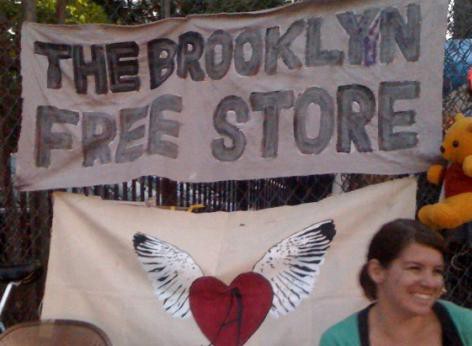
What, you thought we’d been canning our own goods for fun? That we set up farms on the roofs of buildings because we had nothing better to do? Carved “artists’ lofts” out of crumbling factories because they’re so much more aesthetically pleasing? Let me let you in on a little secret here: for any disaster that’s coming, the young Brooklynites? We’re ready to survive it.
We’ve already been experimenting with setting up our own sustainable communities. In fact, you may have read about them in the New York Times, in articles such as “A Commune Grows in Brooklyn” or pretty much any other Styles-section article with “Brooklyn” in the title.
While these articles touch on our preparations (communal living, making swimsuits out of Ikea bags), they luckily didn’t expose the truth — that this has all just been an elaborate practice round.
Think about it. Why else would we eschew “real” jobs for things like baking, bartending or making coffee, all of which are, I might add, entirely end-times-proof professions? (You think people won’t need coffee after the world ends? Or a drink? Trust me, when those four horsemen ride in you’ll be begging for some of our small-batch-hand-distilled whiskey. Begging.)
Living without health insurance? That’s stupid! Unless… you need practice for when things like hospitals and co-payments disappear in a rain of hellfire from the gods. Afterwards you’ll be kicking yourself for not stockpiling your friends’ expired medications, like we’ve been doing since 2005. Or living off your credit cards, once the financial system collapses and all our debt disappears. Or posting those nude photos, once the internet collapses and they all get erased.
The most hilarious thing about all of this is that we’ve somehow convinced you all that the crazy shit we’ve been pulling is actually just because it’s trendy. Mast Brothers embracing pre-industrial techniques to produce a chocolate bar? Come on, who would really go through all that trouble for something so trivial as candy? Unless they knew the end was coming and all industry would be ruined.
Remember when you were all laughing at us for wearing skinny jeans, only to be reading about them in the pages of Vogue the following year? Remember when the same thing happened with leggings, bangs and listening to Arcade Fire? Well this is like that, only with more fire and damnation. After all, we’re the ones who brought America the bedbug plague. When those critters go all mainstream after the fall of man, just remember who had them first.
So go ahead, freak out about the banks crashing and buildings collapsing, and whatever else is supposed to happen in the end of days. I’ll just be here, chillin’ with my fellow hipsters, eating some homemade sprouted grain bread with fresh ricotta from the organic farm farm we set up where the Edge condos used to be.
Erica Sackin is so ready, bitches.
The Late Great Planet Earth
by Robert Lanham
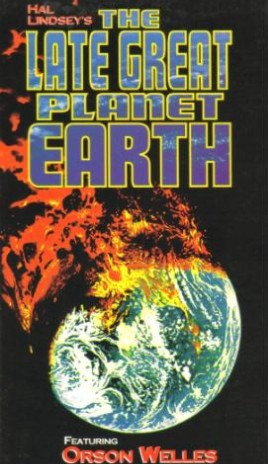
As crazy as it seems now, when I was a freshman in high school I was convinced that my life was going to end, healthy and unadulterated, sometime before December 31st 1988. Of course it’s common for sensitive teens to consider their mortality during those tumultuous years when the hormones start to kick in. But I was different. While other kids pondered death in the conventional fashion — that is, contemplating suicide while listening to the Smiths’ “Heaven Knows I’m Miserable Now” — I came to terms with my mortality the old fashioned way. I learned about it in church.
The specifics of my doom were revealed to me when I was fifteen, in the basement of Bon Air Baptist in the exurbs of Richmond, Virginia. I was among a group of about twenty-five teens who’d assembled in the church’s dark basement for Wednesday night youth group, primarily for the free pizza.
“The Antichrist is alive and well today,” Bon Air’s youth minister Mike Honaker stated assuredly, waving a book called The Late Great Planet Earth above his head.
Honaker was a ruddy, troll of a man, approaching forty, who maintained a bushy beard to conceal a protruding bottom lip packed tight with Skoal Bandits. He was conducting a series on Hal Lindsey’s The Late Great Planet Earth and its apocalyptic interpretation of biblical prophesies. The slim paperback had a picture of the earth in flames on its cover and two hundred pages of prose devoted primarily to the Antichrist. A breezy, beach towel read, perfectly suited for kids of all ages, The Late Great Planet Earth spoke of a terrifying monster called “the gog” that was preparing to incite World War III and kill all the Jews and liberal arts professors. It was, somehow, the bestselling nonfiction books of the Seventies — it spawned a documentary narrated, curiously, by Orson Welles — and was my youth pastor’s current obsession.
“The Antichrist is preparing to reveal himself and this will likely happen in our lifetime.” Honaker said, spewing a little tobacco spittle.
Growing up in the Bible belt during the Reagan years I’d, of course, heard similar proclamations. It was the Eighties and fundamentalists all across the country had their granny panties in a bunch about the “moral decline” of the previous two decades. The so-called “Satanic panic” was in full swing and it wasn’t uncommon to hear sensational allegations of demonic activity on the nightly news. A satanically operated daycare center in Edenton, North Carolina. A Dungeons & Dragons game gone murderously awry in Lafayette, Colorado. Geraldine Ferraro. Before long, Middle America was convinced that every child who owned a Judas Priest record was part of a coven that sacrificed goats in the woods behind the A&P.; Sure, we may not have been worried about terrorists in the Eighties but we had Satanists. And when they weren’t busy stuffing our Halloween candy with razorblades, they were in cahoots with Satan plotting the apocalypse.
Honaker seemed to revel in the tension. Attending his Wednesday night youth group was like watching an Omen marathon on Fox News — a blend of end times paranoia coupled with current events. According to Honaker, the Antichrist was about to take hold of the United Nations (an organization founded by Satanists) and create a one world government under his command.
“Nobody knows exactly when the Antichrist will come to power,” said Honaker , “but Christians can take comfort knowing the Rapture will whisk us away before he does. Mr. Hal Lindsey has done us the great service,” continued Honaker, “of decoding some of the mysteries of Revelation in this book, The Late Great Planet Earth.”
And that’s when he dropped the zinger. The nugget of prophesy that was going to escalate my teenage anxieties for months to come.
“According to Lindsey, praise Jesus, the signs are all in place. We will see the Rapture in our lifetime. Sometime before the end of 1988.”
1988?! I thought with panic, scrambling to put things in perspective. It was already more than halfway through 1986.
If you believed The Late Great Planet Earth’s revelations, Honaker explained, the bible predicted that the Rapture would occur within a generation of the Jews returning to Israel, an event that occurred in 1948. Since many Christians believe that a biblical generation is equal to forty years, establishing a cutoff date for the Rapture was simple math.
Now, if ever an argument was to be made against the effectiveness of Christian abstinence-only education, I’m it. Telling an impressionable kid that his days are numbered is, no doubt, cruel and terrifying. It caused me many a sleepless night. But after I came to terms with my own apocalyptic anxiety, there was something more fundamental I had to consider. My virginity. There was no way I was going to just float away into Heaven before I’d had sex.
And this is where I ran into a predicament. Having grown up among fundamentalists, I believed sex outside of wedlock was a sin that would procure me a one-way ticket to the fiery abyss. Still, I was running out of time. There was simply no way that I was going to be able to meet my future wife, get married, and have sex before 1988. I had a girlfriend, I’ll call her Amanda, but we’d only been dating for a few weeks. I didn’t know her middle name, much less her thread-count requirements for the sheets on the registry. What’s more, I wouldn’t even be able to legally get married until I turned 18… which wouldn’t happen until, um, 1989. Ironically, I’d dated girls before and had successfully sidelined my temptations. But that was before I found out that I was about to get cock-blocked by the Rapture.
Predictably, I began second-guessing my faith. Sex is not a sin, I rationalized, if the world was going to come to an end before I was old enough to wed. There must be an Armageddon technicality. I’d already begun to question the logic of what I’d been taught in church — why would a forgiving god send people to hell? How could two of every known species fit onto the Ark? Why do Christians get stuck listening to all the horrible bands like Petra and Ruscha? — but denying myself the urges that god himself had created, just didn’t make sense.
I’m not sure if the concerns of a nuclear apocalypse drove Cold War-era teens to shed their clothes. (I suspect many felt the time crunch while hiding beneath their desks during the Cuban Missile Crisis.) But when faced with the choice of hell and remaining a virgin for all of eternity, I made the obvious choice. You can’t expect a kid in the throes of puberty to walk the straight-and-narrow, if his reward is an eternity of remorse for having never touched a woman.
In the days to come, I began spending more time with Amanda and, though I was conflicted about the sanctity of premarital sex, I knew that I only had a brief window of time before my world would come to an end. In hindsight who knows, had Honaker not scared the bejesus out of me in that church basement, I may have stayed chaste all through high school. As anyone who knows me will attest, I work best when under a strict deadline.
Of course, 1988 came and went and, with the exception of the release of Crocodile Dundee II, nothing even remotely apocalyptic occurred. By the time I was sixteen, I’d abandoned religious fundamentalism for more compelling things like logic and facts. As I began to question the things I’d been taught growing up, I became curious why an educated adult like Honaker would own an absurd, mean-spirited “book of prophecy” such as The Late Great Planet Earth, or, for that matter, a spittoon. And when 1989 finally arrived, I was happy to have quantifiable proof that Hal Lindsey was a fraud.
If the Mayans are to be believed, 2011 will be the penultimate year of my life. It’s also the year I turn forty which, unlike 17, is a perfectly reasonable age to be when facing an apocalypse. (Author’s note to impressionable youth: nothing to worry about.) I haven’t accomplished everything I‘d hoped for, but I’ve lived long enough to appreciate life. Plus, I’m too old to be drafted in our impending war against asteroids, aliens, antichrists, Rand Paul supporters, or whatever else is slotted to turn our world into a cacophonous Bruckheimer movie in 2012. Best of all, when the Mayan calendar comes to a close, I’ll have made it 26 years longer than I’d ever thought possible the last time I confronted an apocalypse in the basement of Bon Air Baptist.
Robert Lanham is the author of the beach-towel classic The Emerald Beach Trilogy, which includes the titles Pre-Coitus, Coitus, and Afterglow. More recent works include The Hipster Handbook and The Sinner’s Guide to the Evangelical Right. He is the founder and editor of FREEwilliamsburg.com.
Stand-Up in the Post-Apocalyptic Wasteland: Journal Excerpts of the Omega Comedian
by Josh Luft
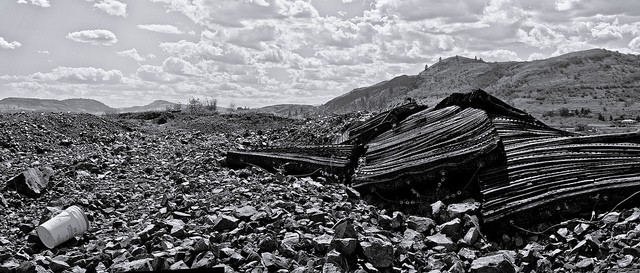
9/22/12
New opening bit: Who do we got out here tonight? Hold on a minute. Is that…? Is that the Road Warrior out there? Do we got Mad Max out in the audience this evening? Wait. No, that’s just Tina Turner’s weave from Beyond Thunderdome. (Start singing “We Don’t Need Another Hero” and try to get the audience to sing and clap along.) Segue into: How is Mel Gibson still racist? There’s only one skin color now — dirt — and he’s that color, too!
9/26/12
Did a show at an actual comedy club instead of some six-legged-rat-infested dump — must still be in use because of its basement location/surplus of booze they had on Doomsday — and opened for Joan Rivers! Joan: “I told ya, yalousy bastards! Me and the fucking roaches!” Talked awhile with her afterwards. Great lady. Made plans to do another show in a month or so. Traded her a ton of make-up for some canned fruit and booze. Knew that fucking make-up would come in handy!
9/30/12
Had a run-in with a pack of mutants today. Was checking out a forest a few miles from the Twin Cities. While walking down the path I thought I found something growing, either new life or something tough like a fuckin’ Phoenix rising out of this shithole. Nope. 2 ltr bottle of Mountain Dew. Went on and ended up finding a little cave with clean fresh water inside! Of course it also had a pack of mutants who came at me. I took a couple out — one and a half, really, since one of the fuckers had two heads and I only hit one — and made it back to the RV. Too close. Scared the hell out of me. Came up with a good bit though: What’s the deal with mutants? Have you seen these fuckin’ things? I know they’ve seen me. They’ve got four fuckin’ eyes for Christ’s sake! Speaking of Christ… It looks like he missed his appointment, huh? Or did he call Reception 24 hrs before the Flashes and say, “Hello, I have an appointment scheduled for tomorrow.” “Name, please.” “Jesus Christ. That’s C-H-R-I-S-T.” “Ah yes, Mr. Christ. We have you down for 10 a.m. tomorrow morning.” “Right, yes. I apologize but I am going to have to cancel that appointment and reschedule for a time after the Apocalypse.” “I’m sorry?” “I need to cancel for tomorrow and reschedule for after the Apocalypse.” “’Apocalypse’? Did you say ‘Apocalypse’?” “Yes.” “Jesus Christ!” “Yes?”
10/5/12
Did a set for what turned out to be a clan of cannibals tonight. I killed. Literally.
NOTE: Need more bullets.
10/24/12
Had Cormac and his wife and kid over tonight. Gave him a new shopping cart and tarp as a gag gift — his wife got the biggest kick out of it. He brought some venison jerky and we drained the rest of the Jack Daniels. Asked if I could use this joke at tomorrow night’s gig: “Had Cormac McCarthy and his boy over for dinner last night. They were delicious.” He fired back, “Well, sure. Nobody’ll be there anyway.”
11/11/12
The Girl was in the audience again — My #1 Fan. After the set I was having a drink with Joan and The Girl came up. Cuter than I thought — free from those damn generator lights. Expected her to ask questions, maybe an autograph. Wanted to barter a drink for her, take her back to the RV and listen to that “NOW! That’s What I Call Music!” CD I found the other night. Her question: “I saw you got a RV. Can I trade some meat, some chicken breasts, for some gas?” Joan cackled, “Honey, last time I offered breasts for gas, the guy farted in my face and told me they’d spoiled!” The girl didn’t laugh, probably hadn’t since before — Joan, of course, went nuts and bitched about her the rest of the night. I ran out to the RV and gave her a cou
ple of gallons. She left right after.
11/18/12
New bit: I was watching “I Am Legend” last night on DVD. (Pause.) What? No one here’s got a DVD player? What are you all, Blu-ray people? You look like a Blu-ray crowd. I say that mostly because of the guy in the back with the fuckin’ shirt made out of Blu-ray discs. It’s a good look for you though, buddy. I saw somebody at last night’s show with VHS tape pants. I didn’t have the heart to tell her that that look was so First-Six-Months-After-the-Apocalypse. She made a faux-pocalypse. (Pause.) I’ll wait for it. Anyway, I was watching “I Am Legend” on DVD last night and I thought, Boy, am I glad THAT creature ain’t around. You know, Will Smith. Then we’d REALLY be fucked.
11/22/12
Stumbled upon a bunker while taking a piss this morning. Some mangy kid popped out and nearly took off my fucking dick with a rusty machete. Once he cooled down, I found out he was all alone, living off cans of Chunky soup and flat cola. Decided to invite him aboard The Chuckle Express. It’s Thanksgiving, after all. Plus, I could use a new assistant…
12/17/12
Finally got to Denver and thank-fucking-Christ I booked some shows for the next week. They don’t want to laugh in Iowa, Nebraska or Wyoming but they do in the Rockies. Must be the lack of air.
NOTE: use this idea for a bit.
12/23/12
NOTE: CUT THIS BIT (or rework?) FROM THE SET — still too soon for ANY computer jokes apparently: I was looting this house last weekend. It was a small, cozy ranch-style number over near Sm — Shit. I might want to go back there this weekend. There’s some stuff left over. I’m not telling YOU fucking savages where it is. Christ. This lady (point at woman in front) started drooling as soon as I said ‘looting’. Save that spit, lady! I don’t know if you’re aware but we’re in a bit of a liquid crisis. So back to this house I was looting. Oh! There she goes again! Somebody get a jar! If she doesn’t want that water, I’ll trade it for a blow job in the next heap they still call a city! Alright, back to the house. I was on the second floor and I found a bookshelf. A full bookshelf. I know, right? As I was grabbing for the next few nights of fire, I noticed this one called The Joy of Cybersex. Anybody remember cybersex? You went online into chat rooms, made up some stupid name like “Luvs2Cuddle” or “CaptFingerBang16” and talked dirty to someone? Or even tried to meet people in real life only to find that you were about to fuck some woman with a giant mole on her face or some slimy pederast? Actually, let me go back a sec. Remember the Internet? Remember fucking computers? That turned out great, didn’t it? Hell, I thought everybody was just using them for porn. Like me. I guess if I hadn’t been in my basement jerking off I’d have known what was going on. I’d be dead, but I’d have known something other than what “BDSM” means before I went. Anyway, what I was trying to get at is, What’s the post-Apocalypse equivalent of cybersex? That’s what I started wondering before burning the book to heat another can of beans. Is there a backroom at the Swaps that I don’t know about? (Segue into Swaps bit — KEEP.)
Josh Luft is a Fool.
Photo by Rick Forgo, from Flickr.
What We Mean When We Say "The End Of The World"
by Bethlehem Shoals

As a child I realized I would die, and thought about it often. My parents, now divorced, both like to recount the time I made this sad, if fairly inevitable, discovery. We were driving by a cemetery; I asked if all animals died, then if people were animals, and when I got my answers, was quiet for a long time. In second grade, I realized that looking forward to summer vacation was the same as eating away at the balance of my time on Earth. It was hard to enjoy the tire swing after that. Two years later, it was even worse. My family went to Montreal (again, the summer) and to this day, I associate the Expos with my own flesh gone cold and rotting.
That fall, I came up with a solution. I would devote myself, steadfastly, to the end of the world. That would be my thing.
In the late eighties, it was possible for a nine year-old to confront the end of the world as a purely theoretical problem. Although I grew up in the South, I don’t think I knew what Revelations was until my teens. The Jewish tradition, or at least the education I received, didn’t exactly make a priority of it. It could scarcely be bothered to articulate heaven and hell. My end of the world was a neat, tidy, and reassuring. Everything would be gone. I wouldn’t turn into a fossil or gasoline. My toys wouldn’t belong to someone else. There was no reason to to worry about irrefutable regret. I didn’t even have to bother with God. The sun would swallow up this planet, and then as the grand finale, the entire universe would collapse on itself. Compared to a world without me, or my spending forever marooned in terrible blankness, it was a metaphysical security blanket.
Let me clarify one thing: I wasn’t looking forward to this merciful poof, or interested in working to bring it about as soon as possible. There was nothing dark about this impulse, if you could even call it that. I really just needed a way out of a particularly nasty thought experiment. Also, like most human beings, especially very young ones, I don’t think I could grasp the end of time and space. This was as much a way to short-circuit my brain as it was an appeal to common sense.
But when you find yourself constantly returning to the absolute End of Everything, a funny thing happens — you start to get really bored, really fast. When we think about death, it’s almost always in reference to the world of the living, or some reasonable facsimile of it. We’re drawn to life; the fantasy of watching your own funeral is as much reflex as pathos. It’s certainly easier to situate ourselves there. The allure of the end of the world was that there was no life, no scraps to cry over or clutch at. However, this also meant that, freed from the feeling that human existence was meaningless, I was stuck contemplating absolute zero. There was something vaguely Buddhist about it all, I guess, although there’s a difference between thinking deep thoughts and being sophisticated enough to care. Anyone who has dropped acid can tell you all about that.
Also, while I had turned to eschatology so I could stop worrying about death and destruction — drain The End of all feeling, as it were — it wasn’t long before I realized what an opportunity I had wasted. There’s the cool, rational response to everything going away forever, and then there’s the belief that, if everything goes away forever, something pretty fucking cool had better happen to make it that way. Paul Boyer’s excellent When Time Shall Be No More chronicles the strange way that the narrative of the Apocalypse has been shuffled in order to resonate with the times; the success of Left Behind depends not on the joyous peace of the Messianic age, but rather on the fireworks and bloodshed that precede it.
Today, this shit is everywhere, and the Rapture, when those stuck on Earth must band together to find the Antichrist, is a great time to make friends and build community. It helps that ultimately, all are united in Christ, but prophecy, not doctrine, is the real lesson here — and the source of so much religious fervor today. When the History Channel or A&E; runs a program about what we can expect when it all goes down, or people clamor for the end to come so they can start the party, they’re not talking about The End. They’re describing a process that brings all the thrills and chills of complete and total negation, one that at the last minute manages to avoid you-know-what. Even a nine year-old could tell you that.
Bethlehem Shoals is a founding member of FreeDarko.com and a regular contributor to NBA FanHouse. Pay attention to his book and FD’s art emporium.
Image by NASA Goddard Space Flight Center, from Flickr.
Not Calling Next Year 'Twenty Eleven' Will Be the End of Us All
by Jack Stuef

About a year ago, without discussing it with one another, we each made a choice: Some of us were going to call this current year “two-thousand ten,” and some of us were going to call it “twenty ten.” For those going with the former, it was a mere continuation of the format we had used for the past decade. And those people were wrong. The double-digits format is easier and quicker to use now, just as it was for all the years we employed it before 2000, and just as it will be if we start to use it uniformly for the rest of this millennium. How do you pronounce “1789”? See, you don’t say “one-thousand seven-hundred eighty-nine.” Unless that’s a rare kind of autism, and you have it.
Twelve months later, society is still divided on what to call this year, and it seems we will be in conflict anew over what to call 2011. These are, after all, the Years of Our Lord, and He has to be getting pretty annoyed with us no longer being able to reach consensus on something as simple as what to call them. It’ll come as no surprise when we get to 2012 and He decides to finally put an end to this pathetic species.
Why are we still not discussing what to call the name of the year? Because we each made our choice on it unconsciously. Some just continued in the format they were using; others switched in their heads to the easier format used for previous decades as a simple matter of efficiency.
Speaking of the end of that world, that late-2009 movie, 2012, didn’t help things. The powers that be surely made the film in order to lull us into believing the coming armageddon is nothing more than a popcorn fiction. In commercials, the title was pronounced “two-thousand twelve.” They wanted us to continue using the same format because they want us to be complacent in all matters leading up to the world’s end.
The illogical continuance of the thousands format is just another sign of the end of world civilization. The double-digits format is practical and streamlined, while the thousands format is whimsical and overfed with syllables. “Twenty eleven” is utilitarian; “two-thousand eleven” is a hedonistic ode to excess.
Why did we start using the thousands format in the first place? Sure, you can argue that, for the year 2000, it was easier and clearer to make that switch. But the format had already been in place years before. It existed in how we pronounced 2001: A Space Odyssey, and we did so because we were othering the shit out of 2000 and beyond. 2000 was once shorthand for a far-off and unreachable future of weird new realities. The thousands format was science fiction.
And to continue to speak about this century in the terms of the speculative writing of the last century is kitschy and backwards. The thousands format is dangerously nostalgic. We’re already well into this century, and we are still talking about it like we eat food in pill form. “Two Thousand Ten” looks like it should be written in a sweeping script, gracing the side of a 1950s tin rocket toy. It shouldn’t be uttered by those who profess to have tiny, previously unimaginable “smart” telephones in their pocket.
Why do businesses allow their employees to walk around saying “two-thousand ten” and “two-thousand eleven”? The divide in what to call the year forces us to stop and think for a moment when we hear someone use a different format than we do. We have to make an effort to remember that. Coupled with the extra time it takes to say “two-thousand eleven” out loud or in one’s head, and that costs American business 95 billion hours a productivity a year at a cost of $49 trillion a year, according to two figures I just made up.
No wonder we’re stuck in an endless recession! The double-digits format is change. It is progress. It is the future. Not the speculative future; the actual future. And when we hold on selfishly to things that no longer work, we begin to tear down the whole history of progress we built. It’s like the fall of Rome all over again, but with a lot more fat people.
According to Google, some people were aware of this problem in late 2009. NPR did a five-minute segment. A website, twentynot2000.com, went up with an accompanying Facebook page with tens of thousands of “twenty ten” adherents. But already, only a year later, that page is a complete wasteland of spam comments. The advocates abandoned trying logic. This thing is just going to persist.
And even if we could get on the same page with how to say the year, we still don’t know what to name the decades. “The aughts” never really caught on for the last one, and calling this one “the teens” just sounds like we want to give it a curfew.
It’s a good thing this will all be over soon. What a waste.
Jack Stuef edits Wonkette and is a contributing writer to The Onion. He lives in Brooklyn and is on Twitter, if you can believe it.
Photo by TheArches, from Flickr.
Actions Have Consequences, or, I'll See You in Hell
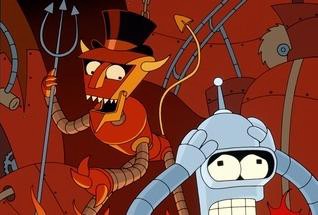
You go to hell. Or: hell comes to you. You are unemployed, pursuing work, any sort. You submit a cover letter so typo-ridden it breaks the Internet. The Internet, of course, is what braces the laws of thermodynamics. So now there’s a temperature colder than absolute zero. Though scientists keep that discovery quiet.
Initially it isn’t too bad, an indefinite shift, your coffee tasting like wine, your hair growing too fast, inert objects gleaming with raw and terrible life. In fact, it might just be you: you were always half-certain you’d lose your grip on things one day, and if not now, when? But reality is what’s unraveling — one can’t ignore the neighbor’s habit of standing on her porch in the mornings and sniffing each page of the newspaper, wincing at the smoky scent of information.
At some point, there is a justified panic. Mobs hurl rocks harmlessly through store windows, discovering that the planet’s glass evaporated overnight. A national emergency is declared over the semantics particular to the phrase “national emergency.” No god ever existed, but because the collapse of quantum mechanics has left causality a two-way street, faith creates one. It personally raptures eight or ten people before it is gunned down outside a Miami nightclub. You wonder where she or he goes after that, because it’s around then that entropy really stretches its mismatched wings.
A fortune cookie informs you that your state will be invaded by a neighboring state, but 40% of all fortune cookies are wrong, and instead you’re on the invading side. Your weapons are slingshots and citrus-smelling spheres that the fourteen-year-old general refers to as “coma fruit.” While on a sabotage mission behind enemy lines, you are captured by lizard people and whisked to a room whose walls glitter with instruments of torture. The reptoids tickle you till you piss.
You go home with a dishonorable discharge for pissing under interrogation. You know that the origami of the universe is in an advanced stage of regress, because the magnetic fields at your place are a little iffy — every piece of silverware is stuck together in a ball. Plus, in your underwear drawer, you discover an epic poem you wrote about the subprime mortgage crisis, and that can’t be right. The clothes in your closet aren’t clothes that you own; they’re the vague, baggy costumes you wear in remote memories. And really, this is what the world has begun to feel like: a remembrance cobbled together by some entity that has vaulted into the next consciousness.
The year drags on, then speeds up, then repeats July four more times, then does March backwards, then skips to the end. You are drinking a lot of beer, or at least trying to (it’s difficult to bridge the desire and the act these days). You find it hard to believe you took nature for granted — nature meaning the balanced books of energy, the long division with no remainder. Of course there was a flaw at the center, because the center has not held. The system was built on a hairline fracture, a fudged ratio.
You can’t be sure how you’ll die, or if dying is even a viable outcome, what with the basis for death a biophysical conceit. Perhaps this is no more than passing flux, and a new set of rules are to follow. A geocentric model. Masses won’t attract. You’ll stare down, not up, at the clouds. And free will will make more sense. None of the dissonance of thoughts like “I was always going to have done that.” Should you not be grateful for this accident? Might another permutation of matter and its opposite yield better results? All you can do is wait on the roof, which drifts out above the burning city, a city that is wave and particle and a third thing also, where numbers and letters are fighting over taxis, and a plaid mist is settling on the inside-out skyscrapers. You can wait, and be gathered into another scheme.
You went to hell. Hell came to you. It is hell, leaving this earth behind. But it’s probably for the best.
Miles Klee is looking forward to it.
